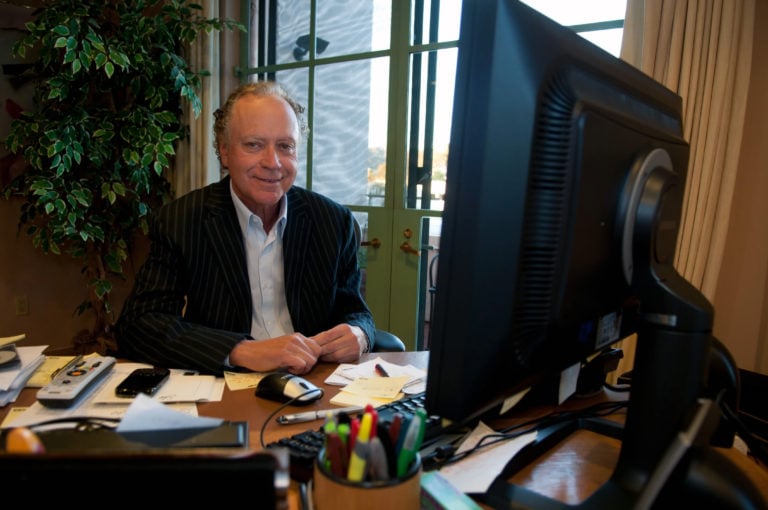
Scott Painter, known as a founder of automotive websites, now is taking a chance on a Beverly Hills technology company that specializes in online poker sites.
It’s a gamble because federal law prohibits interstate online wagering. However, individual states can authorize it under the same legal doctrine that permits lotteries. His company’s prospects brightened last week when a bill was introduced in the California Assembly to license up to three online poker sites.
“I think there is a real opportunity for technology to open up the potential for online gaming to help states generate new revenue,” Painter said. “It’s such a powerful market you can’t ignore it.”
Globally, online poker betting is a $25 billion industry, according to the American Gaming Association, with U.S.-based law-breaking players accounting for about one-third of that total.
Painter’s partners in the company, U.S. Digital Gaming, are Richard Baskin, a music and film producer who founded Internet video-on-demand service Intertainer, and Richard “Skip” Bronson, a shopping center developer and former partner of Steve Wynn at Mirage Resorts in Las Vegas.
Bronson runs USDG while Baskin and Painter continue to work at their own ventures. USDG plans to sell software packages for running online poker sites.
Painter, whose auto websites are CarsDirect.com, Zag.com and TrueCar.com, started a business incubator called BrightHouse in 2007 to find problems and develop companies to solve them.
When Bronson and Baskin approached BrightHouse with the intrastate solution to illegal online poker, Painter saw the potential and signed on.
USDG started in 2008 and has 20 employees. The firm contracts with lawyers, lobbyists and political consultants in more than half of the state capitals. Bronson said for competitive reasons he wouldn’t disclose the states where USDG is active, but he noted that in addition to California, Iowa, New Jersey and Florida have legislation in the pipeline to legalize online poker.
‘Matter of when’
“I guarantee that it will be legal. It’s only a matter of when and where it starts,” Bronson said. “It will occur within the next 18 months, and once the first state does it, there will be a domino effect.”
A huge market of poker players already exists, but the bettors are wagering via illegal sites based in foreign countries. A legislative analysis in Sacramento estimated 1 million Californians play online poker illegally, and other research cites 10 million people in the United States. USDG’s sales pitch is that states should legalize the activity and tax it.
“Nearly every state is near bankruptcy, while billions of dollars are leaving through illegal gaming sites,” Painter said. “That seems a ridiculous outflow of local capital. U.S. Digital Gaming is about helping the states to conduct legal, regulated gaming and to help plug those budget gaps.”
States have two options: They can run a poker site themselves the way they run lotteries, or they can license private groups such as Indian tribes, card clubs or casino operators to run a site and then tax the revenue.
Either way, USDG would collect a percentage of the revenue in return for providing the software system.
Once a state has a financial interest in gaming, Bronson expects the state’s attorney general will step up enforcement against illegal offshore competitors. At present, no one in the United States has been arrested for playing poker illegally under the federal Unlawful Internet Gaming Enforcement Act.
In addition to the lobbying effort, USDG is working on the technical side of its software package. When built out, the package will include age and geographic location verification of players for legal compliance. It also will include security features, online banking to handle the enormous volume of transactions, an ad server to generate additional revenue and immediate tax collection for the state.
Steep odds?
Lou Kreiger, editor of PokerPlayerNewspaper.com, an Inglewood-based website, said USDG faces big political odds.
Historically, established gambling outlets such as race tracks, card clubs and Indian casinos have preferred the status quo rather than a law that benefits competitors. Bills to legalize online poker similar to the one introduced last week in Sacramento have died in the past due to infighting among Indian tribes.
“For California, it would be a hard change, not because of the market, but because of the politics,” Kreiger said.
Bo Bernhard, director of research at the University of Nevada, Las Vegas’ International Gaming Institute, said the big casinos want federal legalization rather than laws passed by individual states. If legalization and taxation occurs nationally, the Las Vegas casinos will marshal billions of dollars to buy established poker sites in the United Kingdom and launch them legally in the United States.
“Size is the advantage that Las Vegas gaming companies already have,” Bernhard said.
Federal legalization would wipe out USDG’s intrastate marketing plan. But Bronson believes that growing financial pressures on states will force them to act first, and whoever gets a state-approved license will become a potential USDG customer.
So far, USDG hasn’t made a single sale. It has supported itself with cash from the three founders and seed money provided by private investors.
Bronson said the company plans another round of equity financing in the next six months for expansion, but for now USDG has sufficient operating capital.
Painter is convinced his timing will pay off.
“There aren’t many times when the political stars align with opportunity,” Painter said. “I believe in USDG.”
